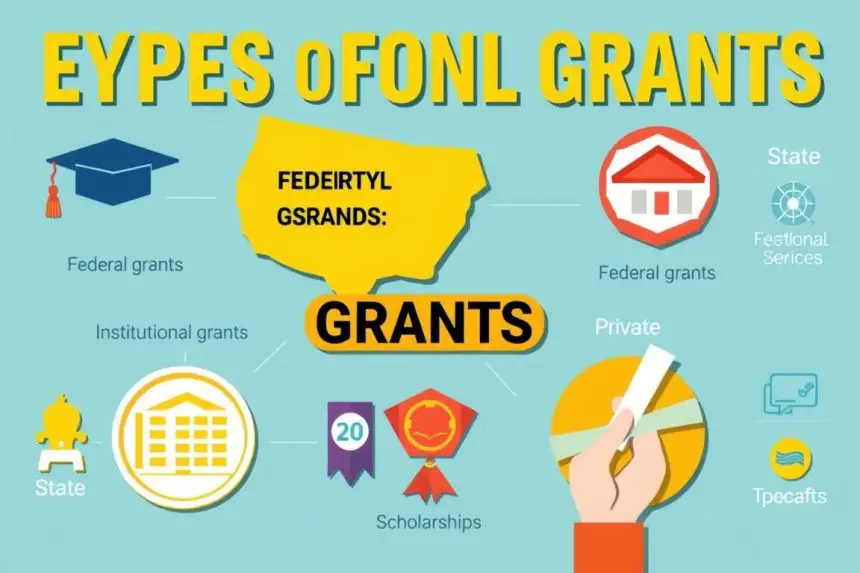Did you know that over 90% of successful nonprofits focus mainly on one revenue source? This fact highlights the importance of educational grants for schools and learners. With the rising cost of college, seeking out financial aid for education is crucial.
Educational grants are special because they don’t need to be paid back, unlike loans. They are provided by the government, private groups, and companies. Their goal is to lower financial barriers, allowing you to concentrate on your studies without worrying about debt. Grants can also support research, innovation, and career growth.
One of the main advantages of an educational grant is it helps you pursue the education you desire. Whether it’s for a bachelor’s degree or a PhD, there are grants for all study areas. This support can shape your academic and career paths significantly.
Getting to know the grant options available can greatly affect your education plans. It’s important to understand the types of grants—federal, state, private, and corporate—and what you need to qualify. Finding the right grants and applying carefully could be a game-changer.
Additionally, your background might affect your eligibility for certain grants. There are specific scholarships for women, minorities, veterans, and those with disabilities among others. These grants help create a diverse and inclusive learning environment, ensuring everyone has a chance to excel.
Key Takeaways
- Over 90% of nonprofits achieving significant growth focused on a primary revenue source.
- Educational grants do not require repayment, easing the financial burden on students.
- Grants support a wide range of expenses, including research, innovation, and career advancement.
- Different fields of study, from Arts to STEM, have specific grants available.
- Specialized grants promote diversity and inclusion, supporting women, minorities, veterans, and individuals with disabilities.
- Financial need is a crucial criterion for grant eligibility.
Understanding Educational Grants
Educational grants are key in providing college funding. They help many achieve academic success. Whether it’s grants for students or career advancement, these aids lessen financial stress. They come from federal agencies, state governments, private groups, companies, and foundations. Each one has its criteria and aims to support different educational areas. Knowing how to find these can help reach your academic and career goals.
Types of Educational Grants
Grants come in five main types. These are federal grants, state grants, private grants, corporate grants, and foundation grants. They support everything from paying for school to backing special projects. Here’s a closer look at some key grants to consider:
| Grant Name | Application Period | Description |
|---|---|---|
| American Association of Educators Classroom Grant | Ongoing | Up to $500 for teachers to purchase classroom resources. |
| American Association of School Librarians Innovative Reading Grant | Due by February 1 | Supports innovative reading programs. |
| Dollar General Summer Literacy Grant | Open in January | Funds literacy initiatives over the summer. |
| DonorsChoose | Ongoing | Platform for teachers to create fundraisers for school projects. |
| NCTM Enhancing Student Mathematics Learning Grant | Due in May | Focuses on improving mathematics education. |
| Ezra Jack Keats Foundation Mini-Grants | Spring | Supports creative and innovative projects by educators. |
| NEA Learning & Leadership Grants | Three application windows annually | Funds professional development for educators. |
| NSF Discovery Research Grant | First Wednesday in October | Supports research that enhances STEM education understanding. |
| Snapdragon Book Foundation Grant | Due in February | Funds books and literacy programs for schools. |
| US GSA Computers for Learning Program | Ongoing | Provides computers to schools in disadvantaged communities. |
| Walmart Local Community Grants | Annual deadline of December 31 | Supports local initiatives that benefit the community. |
When applying for grants for students or education projects, tell a strong story. It should showcase educational hurdles and how to overcome them. Use specific examples, real data, and clear goals. This will make your proposal persuasive, showing the need and possible impact of the grant.
Key Benefits of Educational Grants
Educational grants help a lot by giving money support and tuition assistance. They lessen the financial load of education costs for students and their families. By taking care of expenses like tuition, books, and living costs, grants make higher education easier to get for more people.
Financial Aid and Tuition Assistance
Educational grants offer quick financial help. A typical graduate student in the US has over $70,000 in debt. This big number shows how grants lessen financial stress. People who benefit range from low-income families to first-generation immigrant students. Government grants are very common. Foundation and corporate grants also offer crucial tuition assistance. Individual grants from rich donors help too.
Access to Higher Education
Educational grants help those less represented and low-income students get into college. They help schools reach underserved communities, pushing for educational excellence. This financial aid is key for women, minorities, and veterans. It lets them start higher education and achieve their career dreams.

Support for Research and Innovation
Grants boost academic research and tech progress with funding for new projects. This money helps develop fresh teaching approaches and adds to knowledge in many areas, especially STEM. For instance, Newman University got grants from corporations and foundations. Evergy gave them $8,250 for the NSEP program and $32,000 for Hope Scholars Program. The National Endowment for the Humanities awarded about $34,000. The Kansas Leadership Center gave a Leadership Transformation Grant to improve leadership skills of staff and faculty.
Career Advancement Opportunities
Educational grants let people move forward in their careers by gaining key skills and knowledge. This support helps with professional growth and more job chances. For example, aid for educational achievements and training prepares individuals to better their job prospects. It helps them contribute more to their fields. Newman University’s work with humanities grants shows how such funding helps both teachers and students. Grants really open doors for big career advancement.
Conclusion
Understanding and using educational grants is key to your success. These grants reduce the financial stress of higher education. They help with personal growth, career progress, and innovation.
More money for education leads to better student results. This shows how vital financial help is for school achievements.
Yet, the American education system still faces big challenges. Lack of funding, especially in low-income areas, worsens education inequality. The U.S. doesn’t spend enough on public schools, missing out on about $150 billion a year. This lack of funds hurts minority and low-income students the most.
Government funds and programs like ESSA and IDEA are crucial. They aim to improve reading skills and support students with special needs. Through funding and resources, these programs are shaping the future of education. To learn more, check out this in-depth report on fixing education.
As education changes, we need to keep supporting and growing grant programs. Grants play a big role in removing financial barriers and encouraging new ideas. By working together, we can create a fair and rich education system for everyone.
FAQ
What are educational grants?
Educational grants are funds given to help with learning programs and activities. They are offered by governments, companies, private groups, and nonprofits. These grants help pay for school without needing to be paid back.
How do educational grants provide financial aid and tuition assistance?
They cover costs like tuition, books, and living expenses. This reduces the financial stress on students and their families. It allows them to focus more on studying.
What types of educational grants are available?
There are many kinds, including federal, state, private, corporate, and foundation grants. Each one supports different areas of education and has its own requirements.
How can educational grants help with access to higher education?
Grants give financial help to students from low-income families or those in need. This helps a wide variety of students, including those less represented or with less money, to follow their academic dreams.
What is the role of educational grants in supporting research and innovation?
Grants support new projects and advances in education. They push for new ways to teach and greatly help fields like science and technology.
Are there grants specifically for need-based or merit-based applicants?
Yes, there are grants for students in financial need and scholarships for those who excel in school or activities. Both kinds help students achieve their education goals.
How can educational grants aid in career advancement opportunities?
Grants help with professional growth and further education. This lets people gain important skills and knowledge. As a result, they have better job chances and can move up in their careers.




